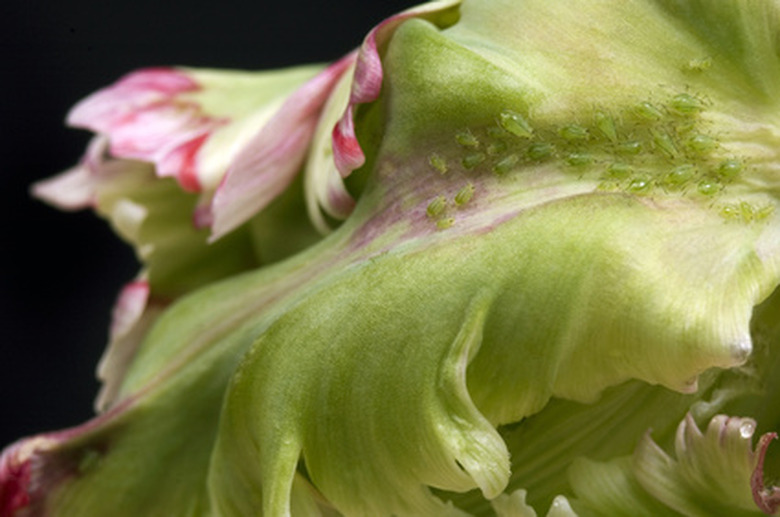Soapy Water For Plants
Using soapy water to control insects on plants is a homemade remedies handed down by grandparents and old farmers who remember a time garden remedies came packaged in tidy plastic bottles. Insecticidal soap has "stood the test of time with its convenience and effective control of specific insect pests," according to Linda Naeve of the Iowa State University Extension, and its effectiveness has even inspired the development of commercial insecticidal soap products.
Function
Soapy water functions as an insecticide by destroying the protective waxy coating on the outside of the insect. This disrupts how the insect's cells allow materials in and out, causing the insect to die as cells lose water. Because of the way it works, soapy water must come in contact with the insect to be effective.
Benefits
For the gardener queasy because of the possible adverse effects of synthetic insecticides, soap formulations offer many benefits. Insecticidal soaps control many common pests while leaving the good critters unharmed, are safe for you and the environment and don't cost a lot of money, according to the Clemson Cooperative Extension.
- Using soapy water to control insects on plants is a homemade remedies handed down by grandparents and old farmers who remember a time garden remedies came packaged in tidy plastic bottles.
- Insecticidal soaps control many common pests while leaving the good critters unharmed, are safe for you and the environment and don't cost a lot of money, according to the Clemson Cooperative Extension.
Homemade Versus Commercial
Soaps have been used to control insects for at least 200 years, according to the Colorado State University Extension. You may be tempted to save money by using homemade insecticidal soaps rather than purchasing a commercially available remedy. But because of the extra lotions, antibacterial agents and other chemicals they contain, homemade remedies are more likely to harm plants and less likely to kill insects, and the extension urges cautious experimentation with homemade remedies. To make a 1 percent solution, mix 1 tsp. per pint of water.
Targeted Insects
Soap mixtures kill many insect pests while harming few beneficial insects. Soap affects most small, soft-bodied insects, such as scale crawlers, mealybugs, aphids, spider mites and psyllids. Most large insects, with the exception of boxelder bugs and Japanese beetles, resist insecticidal soap. The only important beneficial insect harmed by soap is the predatory mite, so if you are trying to control spider mites, avoid applying soap.
- Soaps have been used to control insects for at least 200 years, according to the Colorado State University Extension.
- But because of the extra lotions, antibacterial agents and other chemicals they contain, homemade remedies are more likely to harm plants and less likely to kill insects, and the extension urges cautious experimentation with homemade remedies.
Considerations
Soapy water becomes less effective against insects when it is made with hard water. The Washington State University Extension recommends testing the suitability of your water by premixing the insecticidal soap and letting it stand for 15 minutes. If the soap forms a scum on top of the water, it is not likely to be effective. Soapy water has no residual effect against insects; it must be applied directly onto the insect to work. Always test a small part of the plant before making an extensive application; some plants are sensitive to soaps.
